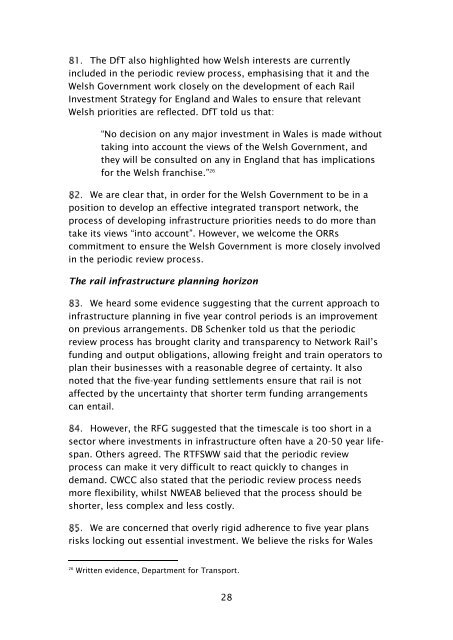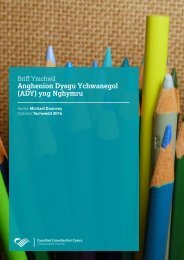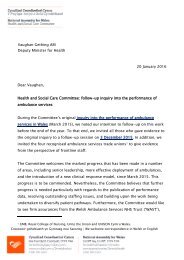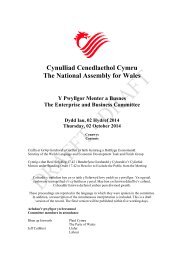Priorities for the future of Welsh Rail Infrastructure
cr-ld10657-e
cr-ld10657-e
You also want an ePaper? Increase the reach of your titles
YUMPU automatically turns print PDFs into web optimized ePapers that Google loves.
The DfT also highlighted how <strong>Welsh</strong> interests are currently<br />
included in <strong>the</strong> periodic review process, emphasising that it and <strong>the</strong><br />
<strong>Welsh</strong> Government work closely on <strong>the</strong> development <strong>of</strong> each <strong>Rail</strong><br />
Investment Strategy <strong>for</strong> England and Wales to ensure that relevant<br />
<strong>Welsh</strong> priorities are reflected. DfT told us that:<br />
“No decision on any major investment in Wales is made without<br />
taking into account <strong>the</strong> views <strong>of</strong> <strong>the</strong> <strong>Welsh</strong> Government, and<br />
<strong>the</strong>y will be consulted on any in England that has implications<br />
<strong>for</strong> <strong>the</strong> <strong>Welsh</strong> franchise.” 26<br />
We are clear that, in order <strong>for</strong> <strong>the</strong> <strong>Welsh</strong> Government to be in a<br />
position to develop an effective integrated transport network, <strong>the</strong><br />
process <strong>of</strong> developing infrastructure priorities needs to do more than<br />
take its views “into account”. However, we welcome <strong>the</strong> ORRs<br />
commitment to ensure <strong>the</strong> <strong>Welsh</strong> Government is more closely involved<br />
in <strong>the</strong> periodic review process.<br />
The rail infrastructure planning horizon<br />
We heard some evidence suggesting that <strong>the</strong> current approach to<br />
infrastructure planning in five year control periods is an improvement<br />
on previous arrangements. DB Schenker told us that <strong>the</strong> periodic<br />
review process has brought clarity and transparency to Network <strong>Rail</strong>’s<br />
funding and output obligations, allowing freight and train operators to<br />
plan <strong>the</strong>ir businesses with a reasonable degree <strong>of</strong> certainty. It also<br />
noted that <strong>the</strong> five-year funding settlements ensure that rail is not<br />
affected by <strong>the</strong> uncertainty that shorter term funding arrangements<br />
can entail.<br />
However, <strong>the</strong> RFG suggested that <strong>the</strong> timescale is too short in a<br />
sector where investments in infrastructure <strong>of</strong>ten have a 20-50 year lifespan.<br />
O<strong>the</strong>rs agreed. The RTFSWW said that <strong>the</strong> periodic review<br />
process can make it very difficult to react quickly to changes in<br />
demand. CWCC also stated that <strong>the</strong> periodic review process needs<br />
more flexibility, whilst NWEAB believed that <strong>the</strong> process should be<br />
shorter, less complex and less costly.<br />
We are concerned that overly rigid adherence to five year plans<br />
risks locking out essential investment. We believe <strong>the</strong> risks <strong>for</strong> Wales<br />
26<br />
Written evidence, Department <strong>for</strong> Transport.<br />
28








